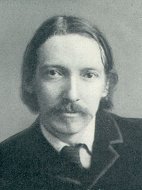|
The songs of Little Nemo are filled with many references to litterature,
movies, TV serials and even radio shows. Here's a list of them. If you
find other ones, feel free to contribute.
LITTLE NEMO

The name of the band comes from the Windsor MacCay comics Little Nemo.
Several pictures are shown in the New flood video, which features a boy
looking like Little Nemo as the main character.
BED IN SUMMER (La cassette froide, 1986).

A poem by Robert Louis Stevenson, author of the "Treasure Island".
Another poem from the same book, "A child's garden of verse"
gave birth to the song Land of counterpane. (see in the
attic)
LES VALLEES DU SONGE (La cassette froide, 1986).

A poem by Constantin Dmitrievtch Balmont translated into french. This
russian symbolist poet (1867-1942) who emigrated to France also translated
westerns authors, such as Edgar Poe. His poem can be read in the
attic .
A UNE PASSANTE (Past & Future,
1987)

A 19th century poem by the famous accursed poet Baudelaire put into music.
Vincent LE GALLO will do it again with the Baudelaire poem, la cloche
fêlée, played live in his solo set on the World is flat tour.
LA BALLADE DES PENDUS (Past & Future, 1987)

Another poem, this time medieval, by François Villon. The precursor of
the accursed poets is said to have written it while waiting in jail for
his own hanging. The sentence was eventually lift.
SECONDS (Past & Future, 1987)
 
"How many seconds up to the 21st century?"At the end of the 20th
century, a digital clock was couting the seconds to the year 2000 on the
Beaubourg center in Paris. The picture of teh band on the front cover
of the Past & future tape was taken in front of the Saint-Eustache Church,
nearby the Beaubourg center.
COUNTER-CLOCK WORLD (Past & Future, 1987)

This is a 1967 science-fiction book by Philip K.Dick, describing a world
in which time goes backwards.
BE SEEING YOU (Past & Future, 1987)

This is the way people salute each others at The Village, in the sixties
TV serial The Prisonner. The song tells the story of the prisonner lived
by Alan, the character of several songs on Past & future. He can't escape
from the Village unless he answers teh question: why did you resign? The
music on the answering machine of Artefact, the label created to release
private life was John Barry's "the persuaders", another famous TV serial.
JOHNNY GOT HIS GUN (Sounds in the attic, 1989)

The song tells the story of the hero of the moving 1939 Dalton Trumbo
book, Johnny got his gun. It was also a movie made by the author himself
in 1964. A young soldier wounded during World War I looses his arms, legs
and all his senses except touch. Alone on his hospital bed, he tries to
communicate with the people surrounding him, especially a nurse. His plea
to die is ignored.
CADAVRES EXQUIS (Turquoise fields, 1990)

This son gis about the famous archeologist Howard Carter, who discovered
Toutankhamon's tomb in 1922. According to the legend, a curse is on those
who entered the tombeau but howard Carter died seventeen years later.
THAT WAS NO MARTIAN (Cadavres exquis EP, 1990)

This song is about the famous Orson Welles radio show. In 1938, he adaptated
the HG Wells book the War of worlds so convingcingly that it led to a
panic among his listeners. The song features extracts from the radio show.
RUBBERT HEARTS (The world is flat, 1992)

A wink to the Beatles' album "Rubber Soul"?
HEARTS BURN (The world is flat, 1992)

Harry White is the main character of the Hubert Selby Jr novel "the demon",
published in 1976.
JOURNEY TO IXTLAN (The world is flat, 1992)

It is the title of the 1972 book by Carlos Castaneda whose books deal
with his experience of sorcery in Mexico.
DISKOVER (Out of the blue, 2013)

The Phaïstos disc, made of clay, was discovered in Crete in 1908.
From the second Millenium, it is covered with hieroglyphs, whose meaning
is the object of numerous theories. It's the only copy found, which make
it the more mysterious.
LE DORMEUR DU VAL (Out of the blue, 2013)

A classic poem by the famous XIXth century French poet Arthur Rimbaud.
Another song about war after Johnny got his gun.
LA NUIT OPERE (Out of the blue, 2013)

A poem by the French author, poet, writer and theater theorician Antonin
Artaud (1896-1948), once linked with the surrealist movement. Another
of his poems, Marine, was put into music in 1989. But for copyright reasons,
it was not used in the song of the same name and Vincent had to write
original lyrics. "Orgues Allemands", one of his poem, also gave
the title to an instrumental track by Vincent on the Unreleased III compilation
in 1990.
POMPEI (Out of the blue, 2013)

The italian town was destroyed in the year 79 by the eruption of the Vesuvius
volcano. Its inhabitants were carbonized and petrified on the spot. The
protective layer which covered the town allowed its conservation until
its rediscovery at the 17th century.
PHAETON AND SUN (Out of the blue, 2013)

On the "mediterranean" album of Little
Nemo, Phaeton is one of the references to the greek mythology. Helios
the Sun grant his son Phaeton one wish, whish is to drive his father's
chariot. Helios vainly tries to deter him. Phaeton looses control of the
chariot, which ablaze the sky and the earthle ciel et la terre. Zeus has
no choice but to blast him.
|

